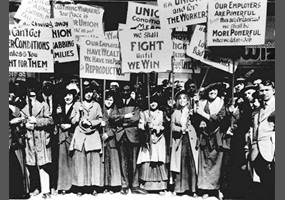
Demanding the vote
Civil society includes both individuals and groups. The groups would include an book club, athletic league, artist guild, merchants association, religious study group and parent – teacher association. People have formed and joined associations in which they have shared interests and needs.
The U.S. Internal Revenue Service identifies that structure this way, “In general, an association is a group of persons banded together for a specific purpose.”
Associations called “guilds” trace their roots back to the Roman times. During the 1800’s the guilds were very common in many trades; blacksmiths, brewers, masons, textile workers and religious confraternities. They served the purpose of assisting its members in learning crafts and trades. You could be mentored then become a journeyman and then a master.
In 1830, French statesman and author of Democracy in America, Alexis de Tocqueville toured America. After his trip he attributed the new countries success with democracy because Americans were disposed to form associations.
The Patrons of Husbandry, otherwise known as the Grange formed after the Civil War. Its founders felt that rural farmers were neither technically proficient nor financially prudent in the business of farming. While they could have chosen any structure to design their association around, they chose a fraternity format modeled after the Masonic Lodge. The created officers, rituals and regalia with a many tiered degree system of obligations. All grangers were governed by a system of Grange laws that was continually refined through a parliamentary process.
Throughout its history, the Grange members, like many associations have gotten involved in many political, economic, and social issues that they felt impacted their members and the communities in which they lived. For example, Grangers lobbied hard for rural mail delivery.
At the same time, other fraternal associations like the Ku Klux Klan have formed for the purpose of pushing back against the legal civil rights granted by the U.S. Constitution that were granted to all peoples. Through speeches, rallies, publications, intimidation and acts of violence, the Klan to this day is a part of civil society that is constantly challenging the foundations of America’s democratic experiment.
One more area that is problematic is how political leaders and corporations have co-opted associations into representing their particular groups of “Seniors”, or “Latinos”, or “Rate payers” to sign on for a policy, program or marketplace initiative. “Broadband for America” is one such strategy representative of more Astroturf groups rather than grassroots associations. One end result is the discontinuation of maintenance of land based phone lines in rural America.
Associations in Civil Society should continually critique the programs and policies they support and be more inclusive of the diverse peoples and needs of their communities.